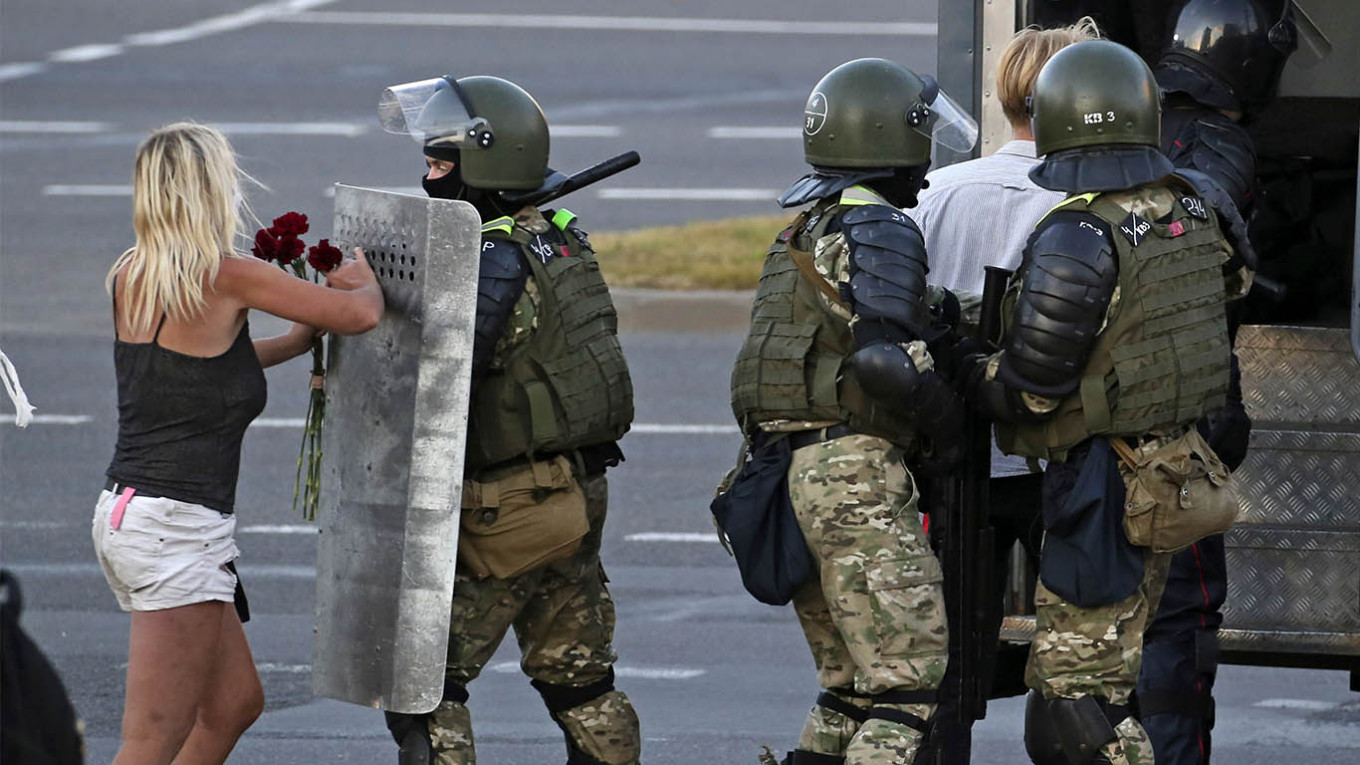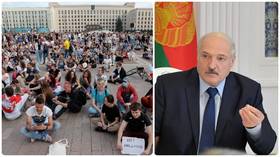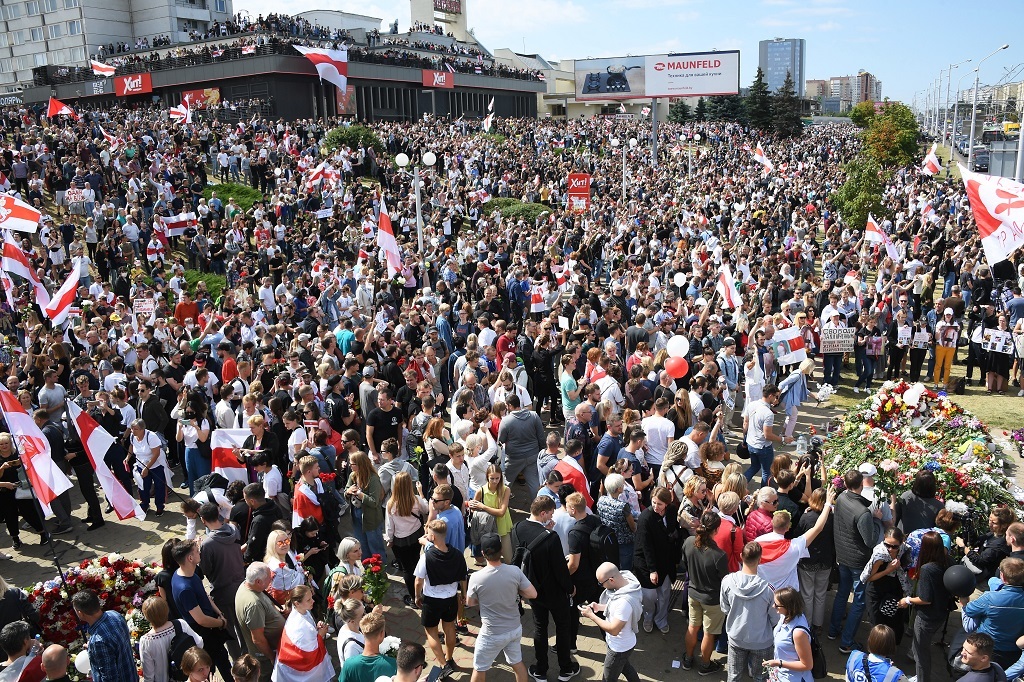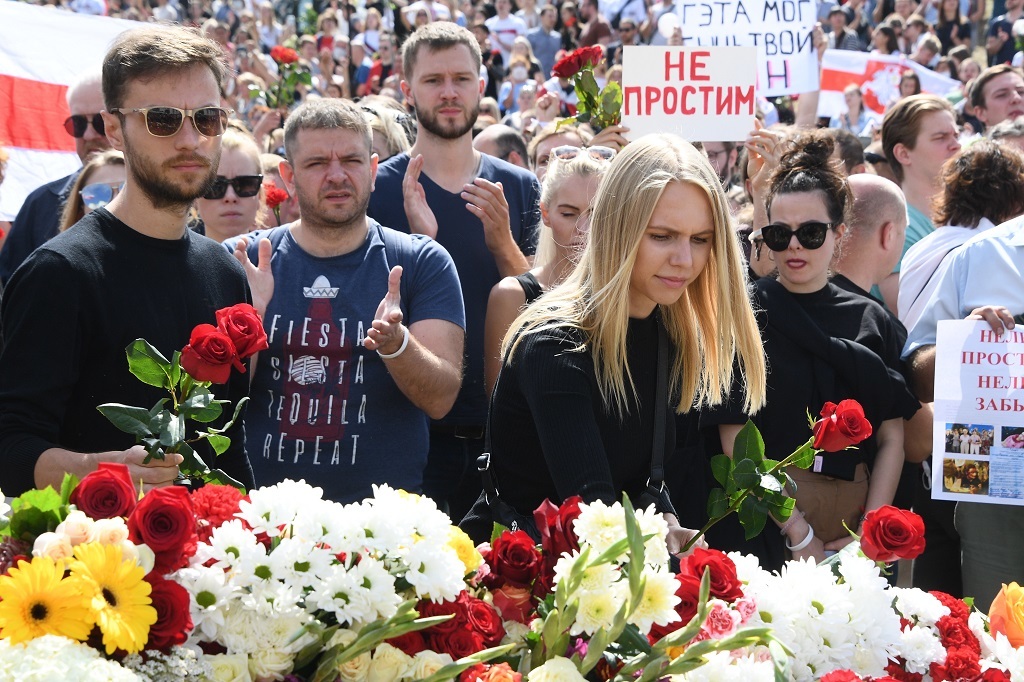Aug. 14, 2020

Natalia Fedosenko / TASS
Tens of thousands of peaceful demonstrators in Belarus have gathered in recent days to protest President Alexander Lukashenko’s disputed victory and the violent police crackdown that followed.
Belarusians formed human chains in cities including Minsk, many wearing white and holding flowers, to protest against police brutality during the four nights of unrest after Sunday’s vote. Official statements Thursday suggested a more conciliatory approach following the public outrage toward extreme police violence, which included shootings and beatings.
Russian media have also taken an increasingly sympathetic tone toward protesters, even as the Russian Foreign Ministry said the protests showed "clear attempts at outside interference."
Here’s a look at how columnists for Russia's widely read pro-Kremlin press have covered the recent nights of protests:
— Izvestia, “How Women Seized the Belarusian Protests”:
“There were no slogans or cheers today. Besides being pointedly peaceful, the demonstration was also quiet. ... There was no cause for concern, there were no police cars along the entirety of the procession route.”
“Violence has noticeably decreased at the night protests. Security forces also adopted a new strategy and stopped noticing small clusters of people.”
“The helmets hid them, but I’m sure there were smiles underneath. The riot police are tired of nights of protest too.”
— Argumenty i Fakty, “Demonstrators ID'd as Parasites. How Did the Latest Protests in Minsk Go?":
“The country has begun to return to normal life. There were almost no violent confrontations with security forces on the streets at night, the protesters did not erect barricades and did not shoot fireworks at police. Detentions were surgical.”
“Still, it’s clearly premature to say that the protests have completely ended. The actions are continuing, but in a new format.”
— Komsomolskaya Pravda, “Lukashenko’s Salvation Is New Polls. Otherwise, It’s Only the Beginning”:
“The protests speak to one thing: we need repeat elections. If they aren’t held (and I’m not sure Lukashenko will go for it), then the situation won’t be resolved. ... I predict an escalation in Minsk this weekend.”
“Yesterday, I saw people being simply snatched from bus stops. ... Today, the situation has changed drastically and the people think one thing: it means we held out, we endured. ... If the government thinks that the people will relent and go home, that’s not what will happen.”
“If the Central Election Commission says there are too many violations and we’ll cancel the elections, that would be most lifesaving for Lukashenko. ... It’s better that he participates in the next elections than remain without them whatsoever. ... If Lukashenko continues to live the old way, then the situation will again meet a dead end.”
— Moskovsky Komsomolets, “Russian Observers as Accomplices to the Lukashenko Regime”:
“If we call Russian parliamentarians who monitored the Belarus presidential elections accomplices of the Belarusian authorities, it’s not offensive. What offense can there be if they participated in a good, noble, worthy cause and not a crime? That is, if they’re to be believed.”
“If these respected gentlemen are to be believed, then the protests broke out and are breaking out over nothing. Not believing them means recognizing them as cynical unprincipled politicians who are ready to call an outright dictatorship a pure democracy for opportunistic or careerist reasons.”
AFP contributed reporting.
Belarus’ Lukashenko says he is being targeted by ‘color revolution’, seeks to join forces with Putin
15 Aug, 2020
Get short URL

(L) A protest in Minsk ©REUTERS / Vasily Fedosenko; (P) Belarusian President Alexander Lukashenko © BelTA / Andrei Stasevich
Follow RT
Mass anti-government protests in Belarus are actually a “color revolution” in action, and Russia may be the next target if the country fails to halt its progress, President Alexander Lukashenko has claimed.
Lukashenko, whose reelection for a sixth term last Sunday sparked mass protests over an alleged rigging of the vote, believes his detractors are unwitting agents of foreign puppeteers and need to be stopped.
“Don’t you lull us with [talk about] peaceful action and demonstrations. We can see what is happening deep down,” the Belarus leader said on Saturday at a government meeting, as cited by local media.
We have read the guidelines on how to conduct color revolutions.
The president added that he should talk to Russian President Vladimir Putin, because “this threat is not against Belarus alone.”
…Defending Belarus today is nothing less than defending our entire space, the Union State [of Belarus and Russia], and an example for others… If Belarusians can’t stand, the wave will flow there.
The proposed conversation with President Putin materialized later in the day. According to a Kremlin readout of the phone call, the two leaders expressed hope that Belarus’ ongoing problems “will be solved soon” and that “destructive forces” wouldn’t capitalize on them to hurt bilateral relations.
Tens of thousands of peaceful demonstrators in Belarus have gathered in recent days to protest President Alexander Lukashenko’s disputed victory and the violent police crackdown that followed.
Belarusians formed human chains in cities including Minsk, many wearing white and holding flowers, to protest against police brutality during the four nights of unrest after Sunday’s vote. Official statements Thursday suggested a more conciliatory approach following the public outrage toward extreme police violence, which included shootings and beatings.
Russian media have also taken an increasingly sympathetic tone toward protesters, even as the Russian Foreign Ministry said the protests showed "clear attempts at outside interference."
Here’s a look at how columnists for Russia's widely read pro-Kremlin press have covered the recent nights of protests:
— Izvestia, “How Women Seized the Belarusian Protests”:
“There were no slogans or cheers today. Besides being pointedly peaceful, the demonstration was also quiet. ... There was no cause for concern, there were no police cars along the entirety of the procession route.”
“Violence has noticeably decreased at the night protests. Security forces also adopted a new strategy and stopped noticing small clusters of people.”
“The helmets hid them, but I’m sure there were smiles underneath. The riot police are tired of nights of protest too.”
— Argumenty i Fakty, “Demonstrators ID'd as Parasites. How Did the Latest Protests in Minsk Go?":
“The country has begun to return to normal life. There were almost no violent confrontations with security forces on the streets at night, the protesters did not erect barricades and did not shoot fireworks at police. Detentions were surgical.”
“Still, it’s clearly premature to say that the protests have completely ended. The actions are continuing, but in a new format.”
— Komsomolskaya Pravda, “Lukashenko’s Salvation Is New Polls. Otherwise, It’s Only the Beginning”:
“The protests speak to one thing: we need repeat elections. If they aren’t held (and I’m not sure Lukashenko will go for it), then the situation won’t be resolved. ... I predict an escalation in Minsk this weekend.”
“Yesterday, I saw people being simply snatched from bus stops. ... Today, the situation has changed drastically and the people think one thing: it means we held out, we endured. ... If the government thinks that the people will relent and go home, that’s not what will happen.”
“If the Central Election Commission says there are too many violations and we’ll cancel the elections, that would be most lifesaving for Lukashenko. ... It’s better that he participates in the next elections than remain without them whatsoever. ... If Lukashenko continues to live the old way, then the situation will again meet a dead end.”
— Moskovsky Komsomolets, “Russian Observers as Accomplices to the Lukashenko Regime”:
“If we call Russian parliamentarians who monitored the Belarus presidential elections accomplices of the Belarusian authorities, it’s not offensive. What offense can there be if they participated in a good, noble, worthy cause and not a crime? That is, if they’re to be believed.”
“If these respected gentlemen are to be believed, then the protests broke out and are breaking out over nothing. Not believing them means recognizing them as cynical unprincipled politicians who are ready to call an outright dictatorship a pure democracy for opportunistic or careerist reasons.”
AFP contributed reporting.
Belarus’ Lukashenko says he is being targeted by ‘color revolution’, seeks to join forces with Putin
15 Aug, 2020
Get short URL

(L) A protest in Minsk ©REUTERS / Vasily Fedosenko; (P) Belarusian President Alexander Lukashenko © BelTA / Andrei Stasevich
Follow RT
Mass anti-government protests in Belarus are actually a “color revolution” in action, and Russia may be the next target if the country fails to halt its progress, President Alexander Lukashenko has claimed.
Lukashenko, whose reelection for a sixth term last Sunday sparked mass protests over an alleged rigging of the vote, believes his detractors are unwitting agents of foreign puppeteers and need to be stopped.
“Don’t you lull us with [talk about] peaceful action and demonstrations. We can see what is happening deep down,” the Belarus leader said on Saturday at a government meeting, as cited by local media.
We have read the guidelines on how to conduct color revolutions.
The president added that he should talk to Russian President Vladimir Putin, because “this threat is not against Belarus alone.”
…Defending Belarus today is nothing less than defending our entire space, the Union State [of Belarus and Russia], and an example for others… If Belarusians can’t stand, the wave will flow there.
The proposed conversation with President Putin materialized later in the day. According to a Kremlin readout of the phone call, the two leaders expressed hope that Belarus’ ongoing problems “will be solved soon” and that “destructive forces” wouldn’t capitalize on them to hurt bilateral relations.
ALSO ON RT.COM Thousands of workers march to Belarus parliament from Minsk tractor factory as protests intensify (VIDEOS)
Lukashenko is facing increasing pressure from the public after his government launched a police crackdown on the opposition in the wake of last week’s vote. The approach backfired after evidence of police brutality fueled discontent and prompted more people to take the streets and demand the president’s resignation.

©Sputnik / Viktor Tolchko
The demonstrations continued on Saturday, with thousands gathering in central Minsk to commemorate a protester who died amid the crackdown.

©Sputnik / Viktor Tolchko
Belarus police said that Aleksandr Traykovskiy died after an improvised explosive device went off in his hand before he could throw it at officers. Opposition forces question this version of events, however, suspecting instead that he may have been fatally injured by law enforcement.
Lukashenko is facing increasing pressure from the public after his government launched a police crackdown on the opposition in the wake of last week’s vote. The approach backfired after evidence of police brutality fueled discontent and prompted more people to take the streets and demand the president’s resignation.

©Sputnik / Viktor Tolchko
The demonstrations continued on Saturday, with thousands gathering in central Minsk to commemorate a protester who died amid the crackdown.

©Sputnik / Viktor Tolchko
Belarus police said that Aleksandr Traykovskiy died after an improvised explosive device went off in his hand before he could throw it at officers. Opposition forces question this version of events, however, suspecting instead that he may have been fatally injured by law enforcement.
No comments:
Post a Comment